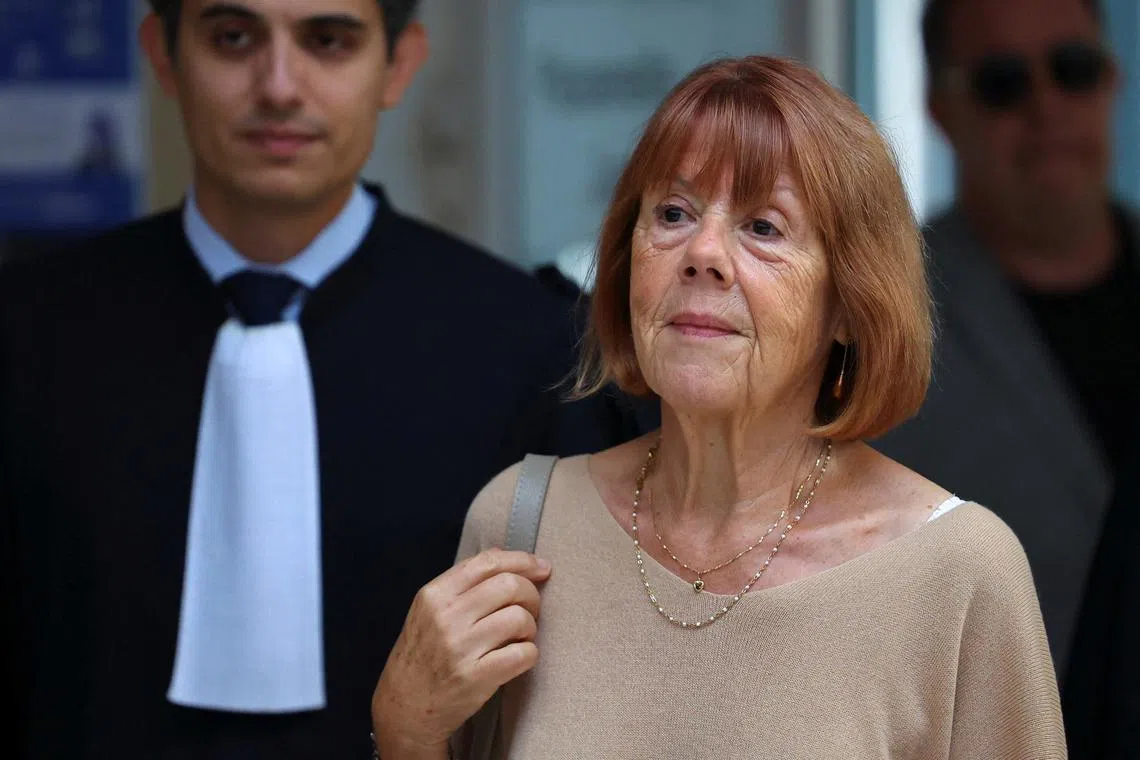‘Still shocked’: Southern French town reels from mass rape case
Sign up now: Get ST's newsletters delivered to your inbox

Ms Gisele Pelicot has requested the trial be open to the public to raise awareness about the use of drugs to commit sexual violence.
PHOTO: REUTERS
MAZAN, France - Retiree Lina Blazy used to think fondly of her quiet southern French town of Mazan.
But its name in recent days has been flung into the media spotlight, linked to a mass rape case that has horrified many in France and abroad.
“It’s a small, quiet and fairly nice village. I would never have thought something like that could happen here,” she said.
“We’re still shocked when we see the word Mazan on television.”
Until recently, the town of some 6,000 people had only received a few mentions in world news, mostly as where English actress Keira Knightley married English musician James Righton in 2013.
But in 2020, police discovered a retiree who had moved to the town from the Paris region had for almost a decade been secretly drugging his wife to invite strangers to rape her in her own bed and filming the abuse.
Dominique Pelicot, 71, has admitted to the charges against him
Another 50 men aged 26 to 74 – including single men, married fathers and divorcees with everyday jobs – are being tried for alleged involvement.
His former wife Gisele Pelicot, 71, was troubled for years by memory lapses and found out about the abuse from police.
She has requested the trial be open to the public to raise awareness about the use of drugs to commit sexual violence.
‘Not great publicity’
At the bakery in Mazan, owner Annie Viau fervently defended her neighbours.
“Some say we’re a town of rapists, but that’s not true,” she said.
“For me, the rapist isn’t from Mazan, he’s Parisian – though it did happen here, unfortunately,” she added.
Pelicot and his then wife moved to the town in 2013. The abuse had started in 2011, according to investigators.
At a nearby cafe, many patrons refused to speak to AFP, tired of being approached by media since the case became public.
In a troubling coincidence, the town still houses a chateau hotel that was once the family home of the Marquis de Sade, the 18th-century writer whose controversial novel characters inspired the word “sadism” to refer to deriving pleasure from hurting someone else.
At the trial, one expert has described the main defendant’s “sexual sadism and wish to humiliate his wife”.
Investigators listed 72 men suspected of having taken part in abusing Ms Pelicot other than her husband, but only managed to identify 50.
All those 50 are on trial, including one in absentia
Sitting at a cafe, Mr Frederic Raymond, a retiree from a neighbouring town, said the case was “not great publicity for the town or region”.
“Sometimes you cross paths with people in Mazan and you think, ‘Maybe...’ It could be anyone. Sick people don’t have a sign on their forehead,” he said.
‘So it never happens again’
Mayor Louis Bonnet said a certain anxiety had descended on the town, especially as some suspects remain at large.
“Those people could be from the town – or they could not,” he said.
“We could be seeing them at the petanque court, in the shops or anywhere else.”
He said there have been no plans so far to set up a mental health response unit in the town or its schools.
“Nobody has yet come to see me to say, ‘I’m shocked, the mayor’s office needs to help me...’ But if we need to do it, we will,” he said.
Resident Cecile Paulin said she thought it was important to talk it out.
Ms Paulin, the founder of a women’s centre in town offering massages and parental support, said she was “shocked and devastated” by the rape case.
She wanted to host “a place where people could talk freely” – for victims, but also “all the women and men who need it” and “collateral victims like the partners of the co-defendants”.
“We can’t bury our heads in the sand,” she said.
“We need to talk about it so it never happens again.” AFP


